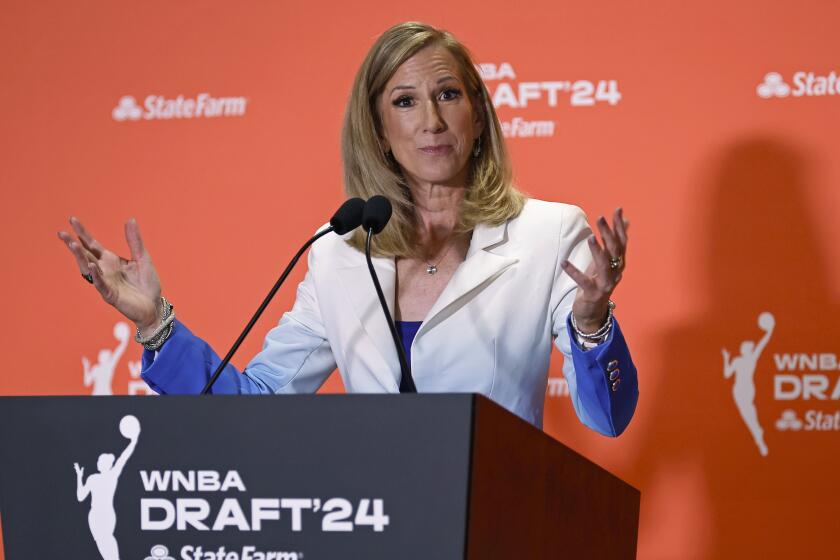Escape Clause
Will the Sacramento Kings move to Anaheim, Irvine or anywhere else in the next decade? Too soon to say, but a novel loan agreement with the city provides the Kings a rare option to move without financial penalty.
Typically, NBA teams play under long-term leases in arenas owned or operated by local governments, and a team wishing to leave before its lease expires must attempt to negotiate a settlement with a government that likely spent many millions to build the arena.
The Kings built Arco Arena without public contributions, and they own and operate the facility, so the city had no say in whether the team stays.
When the Kings sought financial help last year, the city approved a $70-million loan to refinance the building at rates available to a municipal borrower but not to the team. In return, the Kings committed to play in Sacramento for 30 years, but not before negotiating several “get out of town free” cards into the loan agreement.
“We did not get a subsidy,” said Jim Thomas, a Los Angeles developer and the team’s majority owner. “The only thing we got was the use of the city’s credit, which didn’t cost the city anything.”
While Sacramento officials want the team to stay, they placed a high priority on keeping the arena running even if the Kings leave, preserving the major entertainment venue between Nevada and the San Francisco Bay Area and its thousands of full- and part-time jobs. Even without the NBA, concerts, circuses and other events fill the arena for some 150 dates each year.
According to Sacramento city Treasurer Tom Friery, the Kings make money on arena operations but lose money on basketball operations. If the Kings depart, the city believes the favorable refinancing would enhance the chances of the team owners continuing to run the arena or selling to someone who would.
“If they’re not competitive and they’re not going to make money, we’d be foolish to keep them here,” Friery said. “They could pay the loan back, and there would still be some economic benefit to our area because of all the other events at the arena.”
The Kings need not stay in Sacramento for even half the term of the 30-year agreement. After the first 10 years, they can leave town simply by repaying the loan.
The Kings can leave before then if, in addition to repaying the loan, the Kings’ revenue falls a designated percentage below the NBA average and the team loses money. Even a small profit may not hinder a move.
“Under generally accepted accounting principles, I can turn a $4-million profit into a $2-million loss, and I can get every national accounting firm to agree with me,” Paul Beeston, then president of the Toronto Blue Jays and now chief operating officer of Major League Baseball, once said.
If the Kings lose money, they must satisfy one of three additional conditions to qualify to repay the loan and leave town within the first 10 years. The Kings would meet one of those requirements should their revenue drop below the league average on a sliding scale, from 25% below average during the coming season to 17.5% below average by 2002.
In 1997, Financial World magazine estimated the Kings’ revenues at 12% below the NBA average. As NBA rivals continue to move into new arenas that double as virtual cash machines, and as cable rights fees in larger media markets dwarf those available in Sacramento, the Kings’ revenues should drop below the 17.5% standard that qualifies them to depart.
“It’s pretty clear the Kings will fall under that mark eventually,” said Bill Miller, managing editor of Chicago-based Team Marketing Report. “It’s only a matter of time.”
Thomas does not concede that inevitability and does not believe the Kings must ultimately choose between staying in Sacramento or staying financially competitive with NBA rivals.
“The concept was, if the community does not support us, we would have the option to relocate. The next best thing would be for us to pay off the loan and relocate,” Thomas said. “In point of fact, I do not expect that to happen. It’s a challenge in Sacramento right now, but I think it will work.”
More to Read
Get our high school sports newsletter
Prep Rally is devoted to the SoCal high school sports experience, bringing you scores, stories and a behind-the-scenes look at what makes prep sports so popular.
You may occasionally receive promotional content from the Los Angeles Times.







